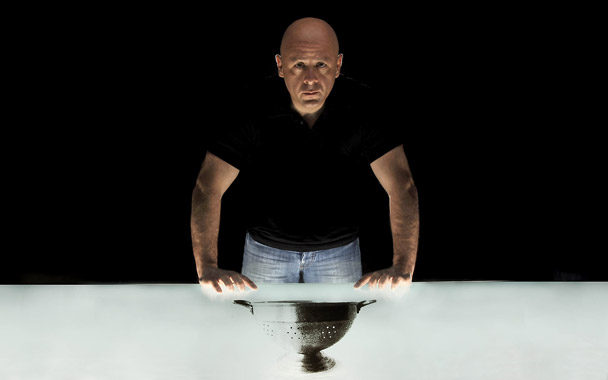At the beginning of a new century, Marxism is provoking heated debates in France all over again. This time around, however, the Marx in question isn’t Karl; it’s Thierry, the 47-year-old, Michelin-two-star chef based at the Chateaux Cordeillan-Bages wine estate in Gironde, north of Bordeaux. Though the French press inevitably casts Marx as the “French Ferran Adrià” (meaning he’s an odd-ball avant-garde chef who does spooky things with space-age technology and serves weirdo dishes, such as a “virtual” sausage made of meat, lentils, melted fat, and bouillon encased in a little balloon that’s snipped open over a soup dish at the table), the comparison to the other Marx is in some ways just as apt. Thierry, the Marx who cooks, regularly shocks, puzzles, and infuriates the French establishment.
The latest furor has to do with Marx’s defense of la cuisine moléculaire. Culinary France has been in an uproar following a recent article in Le Monde that accused chefs like Marx, Adrià, and Heston Blumenthal of endangering their customers’ health by using frightening food additives. (A “false debate,” according to Marx.) More telling, perhaps, are his anti-bourgeois instincts. He teaches cooking classes in a penitentiary, is fascinated by street food, and has just written a free cookbook for Les Restaurants du Coeur, a national association that runs food banks and soup kitchens in most major French cities.
“Much of what I do is about trying to set French cooking free from its bourgeois cage,” says Marx. Chic in a black cashmere sweater and gray Yohji Yamamoto silk scarf, Marx arrives for coffee in the kitchen of Le Laboratoire (“an experiential culinary space” that he opened with several partners in Paris last year) and starts talking before he’s been asked a single question.
“In France and other Western countries, when you lose your job, you’re banished from consumption, which means you no longer have the right to gastronomic pleasure. This is wrong,” he insists, “especially since social mobility stalled in most of the big Western countries thirty years ago. At the dawn of the digital age, we have to move humanity back to the heart of society, and understand the importance of the link between the technical and the emotional.”
Resolutely drawn towards the future, Marx will debut a new concept restaurant in Paris this fall. “I want to create a place that’s convivial, democratic, and lively, open to all, and to serve healthy, interesting food,” he explains. Unlike most French chefs, Marx isn’t nostalgic for the bistros of yore. Having grown up in the rough-and-tumble working-class Belleville neighborhood of Paris, he remembers bistros as “sad smoky places where people drank too much and escaped their frustrations by playing pinball machines. For me, there’s nothing sentimental about them.”
Born in France in 1961, Marx’s heritage is Jewish-Polish; his Polish grandfather only won French nationality by fighting for the French army during World War I. Growing up, Thierry ate North African and Asian food instead of traditional French dishes like blanquette de veau. “We cooked to eat,” he says, “usually in a hurry, with a lot of potatoes.” When he was 16, hoping to avoid working in a factory like so many of the kids he’d grown up with, Marx began a journeyman’s apprenticeship that trained him as a pastry cook, chocolatier and ice cream-maker. “I had to learn French food the same way that someone from India or Mexico would.”
This outsider’s perspective informs Marx’s passionate interest in street food and his irreverent approach to the traditions of French cooking. (“It was once a tradition to burn supposed heretics, which shows that tradition isn’t infallible,” he wryly notes.) Where does the iconoclast see French food headed? “I don’t believe in national kitchens anymore,” he says. “Cooking has become planétaire (global). Today it’s more about an individual’s style than his passport, and this is an exciting time because so much experimentation is going on. Ferran Adrià opened a new pass through the mountains, and I am grateful to him for that. The new techniques that have been invented—encapsulation, cooking at very low temperatures, thermic shock—are supplementary tools for chefs, and they’re now becoming part of our collective mind. The new machines and methodologies let me push forward and explore, which is what I must do. Today, people want to experience strong emotions when they come to a restaurant for a meal.”
At his new place, Marx plans to offer a fresh take on global street food with, he says, major Japanese, North African, and Indian influences. In the meantime, he can be found provoking the establishment with a liquid quiche Lorraine or a deconstructed lemon tart.



 Pinterest
Pinterest


